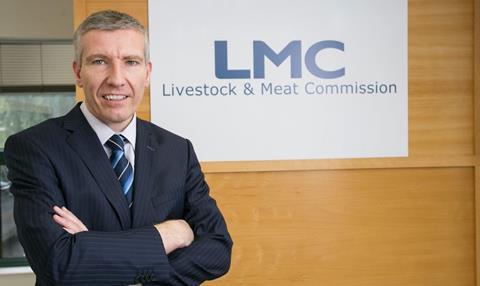Livestock and Meat Commission for Northern Ireland (LMC) chief executive, Ian Stevenson, has highlighted the vital roles that workers throughout the farming and food processing sectors are fulfilling as they help feed the nation at a time of national crisis.

Stevenson said: “Our beef and lamb processing companies and their dedicated staff and farmer suppliers are playing a critical role in this regard. Ensuring that all our food chains remain intact is critically important as the entire country confronts the tremendous challenges posed by Covid-19.”
“We are extremely proud of those key people who are going to work each day whether on farms, animal feed merchants, veterinary practices, haulage firms, processing facilities or retail outlets to help feed the nation and combat the Covid-19 threat.
“The continuing availability of food, including farm quality assured beef and lamb, is critical to the nation at this time.
“I commend the steps that employers are taking to ensure that all their staff members are working in conditions that conform to the latest Covid-19 guidelines, set out by Government.”
Red meat
The red meat industry contributes £1.3 billion to Northern Ireland’s economy annually and is recognised as one of the key industries that must be kept operational.
Ian Stevenson continued: “There has been a significant shift in the demand for beef and lamb in recent weeks with strong growth in retail sales while sales to food service customers have dwindled. This is a direct response to the shutdown of the food service sector and greater consumption of food in the home environment. The lamb market has been particularly impacted by the food service and restaurant sector shutting down across the UK and EU, as lamb is widely enjoyed as a meal choice out of the home.
“With regards to beef the shift in demand from key market outlets has created notable challenges for our local processors in supplying the products that the market wants.
“The over-riding objective of the food industry at this time is to help keep the nation fed. And I cannot praise highly enough the efforts being made by workers right across Northern Ireland’s red meat industry supply chain in helping to make this happen.”
“While there has been growth in demand for forequarter beef in particular from retail customers, sales of higher value hindquarter and steak cuts have struggled which creates challenges in terms of carcase balance.
“Local beef and lamb processors have been striving to deal with this significant shift in demand. From the very outset of the Covid-19 crisis, these companies have been proactive in introducing social distancing measures and other safety and well-being protocols even prior to what is now government advice.
“This process has involved liaison at the very highest level between representatives of the processing industry and a wide range of public health officials including the Department of Agriculture, Environment and Rural Affairs, the Food Standards Agency and Public Health Authorities. These contacts will, no doubt, continue to be strengthened over the coming weeks.”
He concluded: “Food businesses are not seeking to maximise their profits as a consequence of Covid-19. Ensuring the health and safety of workers will always be the number one objective of all businesses in the farming and food sector.
“The over-riding objective of the food industry at this time is to help keep the nation fed. And I cannot praise highly enough the efforts being made by workers right across Northern Ireland’s red meat industry supply chain in helping to make this happen.”
This story was originally published on a previous version of the Meat Management website and so there may be some missing images and formatting issues.















